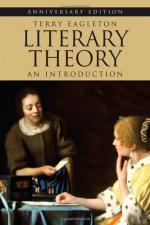
|
| Name: _________________________ | Period: ___________________ |
This test consists of 15 multiple choice questions and 5 short answer questions.
Multiple Choice Questions
1. According to the Soviet semiotician Yury Lotman, a poetic text is "semantically _________."
(a) Irrational.
(b) Saturated.
(c) Rational.
(d) Transparent.
2. How did post-structuralism respond to France's student movement's failed attempt to break state power?
(a) Post-structuralism sought to break the structures of language.
(b) Post-structuralism sought to break state power.
(c) Post-structuralism sought to create a more powerful language.
(d) Post-structuralism sought to create a free language.
3. According to Eagleton, if structuralism examined the "product" of literature, but left out what?
(a) The immaterial conditions inherent in the product.
(b) The immaterial conditions that produced literature.
(c) The material conditions that destroyed literature.
(d) The material conditions that produced literature.
4. What commonality does structuralism and phenomenology share, according to Eagleton?
(a) They both immerse themselves in the material world in order to understand the subconscious.
(b) They both immerse themselves in the material world in order to become conscious of it.
(c) They both shut out the material world in order to understand our consciousness of it.
(d) They both shut out the material world in order to revert to pre-consciousness.
5. According to Eagleton, there are forms of post-structuralism that represent what kind of withdrawal from history?
(a) Intellectual.
(b) Hedonist.
(c) Calm.
(d) Pragmatic.
6. According to Eagleton, structuralism has proved that there is nothing _____ about codes.
(a) Innocent.
(b) Progressive.
(c) Evaluative.
(d) Guilty.
7. What does Jacques Derrida label any thought system which depends on an unassailable foundation?
(a) Teleological.
(b) Philosophical.
(c) Mythical.
(d) Metaphysical.
8. What are Northrop Frye's four narrative categories at the root of all literature?
(a) Romantic, tragic, idealism, ironic.
(b) Fiction, fact, reality, idealism.
(c) Comic, romantic, tragic, ironic.
(d) Comic, reality, idealism, tragic.
9. According to Eagleton, the Western philosophical tradition has "consistently vilified" what?
(a) Speech.
(b) Writing.
(c) Man.
(d) Myth.
10. According to Eagleton, why is Sigmund Freud's discussion of women problematic?
(a) Because of his refusal to discuss women in his work.
(b) Because of his sexist and demeaning attitudes toward women.
(c) Because of his glorification of men in his work.
(d) Because of his troubling personal relationships.
11. According to Eagleton, why did the women's movement reject the economic focus of classical Marxist thought?
(a) Because it failed to place sexual ideology at the heart of its theory and practice.
(b) Because it placed sexual ideology over the material conditions at the heart of its theory and practice.
(c) Because it succeeded in placing sexual ideology at the heart of its theory and practice.
(d) Because it failed to place material conditions over sexual ideology at the heart of its theory and practice.
12. For the literary theorist, Mikhail Bakhtin, "linguistic community" was what kind of society?
(a) Homogenous.
(b) Exclusive.
(c) Heterogeneous.
(d) Inclusive.
13. Why do feminists embrace the work of Jacques Lacan, despite the fact that he was contemptuous of the women's movement?
(a) Because Lacan embraced Freudianism.
(b) Because Lacan rewrote Freudianism.
(c) Because Lacan rejected Freudianism.
(d) Because Lacan taught Freudianism.
14. What is a belief in "ultimate word, presence, essence, truth, or reality"?
(a) Logocentric.
(b) Egocentric.
(c) Phallocentric.
(d) Technocentric.
15. According to Sigmund Freud, what is the name of the complex whereby a child experiences an unconscious desire for sexual union with its same sex parent?
(a) The Medusa complex.
(b) The Eros complex.
(c) The Pandora complex.
(d) The Oedipus complex.
Short Answer Questions
1. Jacques Lacan argues that like _______ desire emerges from a lack, which it strives to fulfill.
2. Eagleton writes that his book is less an introduction to literary theory than a what?
3. According to Eagleton, why is Shakespeare considered great literature?
4. According to Eagleton, structuralism exposed what "shocking truth"?
5. Why should politics engage with questions of sexual ideology, according to Eagleton?
|
This section contains 686 words (approx. 3 pages at 300 words per page) |

|




